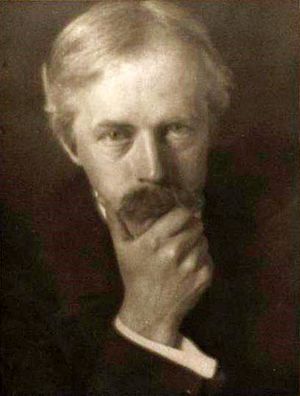Arthur Symons facts for kids
Arthur William Symons (born February 28, 1865 – died January 22, 1945) was a British poet, a writer who shared his opinions on books and art (a critic), and someone who managed magazines.
Contents
Life of Arthur Symons
Arthur Symons was born in Milford Haven, Wales. His parents were from Cornwall. He was taught at home and spent a lot of time in France and Italy.
From 1884 to 1886, he helped edit special copies of William Shakespeare's plays. He also worked for important magazines like Athenaeum and Saturday Review. One of his most important jobs was editing The Savoy, a magazine that didn't last very long.
His first book of poems, Days and Nights (1889), was made of dramatic monologues (poems where one character speaks). Later, his poems were inspired by French writers like Charles Baudelaire and Paul Verlaine. Symons wrote poems and essays for The Yellow Book. One of his important essays grew into a book called The Symbolist Movement in Literature. This book greatly influenced famous writers like William Butler Yeats and T. S. Eliot.
From late 1895 through 1896, he helped edit The Savoy with Aubrey Beardsley and Leonard Smithers. This magazine featured both art and writing. Famous writers like Yeats, George Bernard Shaw, and Joseph Conrad contributed to it. Symons was also part of the Rhymer's Club, a group of poets started by Yeats in 1890.
In 1892, Symons's first play, The Minister's Call, was performed by a private group called the Independent Theatre Society. This was done to avoid problems with censorship (rules about what could be shown) from the Lord Chamberlain's Office.
In 1901, Arthur Symons married Rhoda Bowser (1874–1936). She was an aspiring actress.
In 1902, Symons chose some of his earlier poems and published them as Poems. He also translated books from Italian and French into English. For example, he translated The Dead City and The Child of Pleasure by Gabriele D'Annunzio. He also translated The Dawn by Émile Verhaeren. In 1909, Symons faced some health challenges that affected his ability to write new works for over twenty years. His wife, Rhoda, helped manage his affairs during this time. He later wrote about his experiences in his book Confessions: A Study in Pathology (1930).
His wife passed away in 1936. Arthur Symons died in 1945.
Works by Arthur Symons
Arthur Symons wrote many different kinds of works, including poetry, plays, essays, and fiction.
Poetry and Plays
- Days and Nights (1889)
- Silhouettes (1892)
- The Minister's Call (1892). A Play.
- London Nights (1895)
- Amoris victima (1897)
- Images of Good and Evil (1899)
- Poems (1902)
- Lyrics (1903)
- A Book of Twenty Songs (1905)
- The Fool of the World and other Poems (1906)
- A Book of Parodies (1908)
- Poems by Arthur Symons (1911)
- Knave of Hearts (1913). Poems written between 1894 and 1908.
- The Toy Cart (1916). A Play.
- Tristan and Iseult: A Play in Four Acts (1917)
- Tragedies (1922)
- Love's Cruelty (1923)
- Jezebel Mort, and other poems (1931)
Essays and Criticism
- An Introduction to the study of Browning (1886)
- Studies in Two Literatures (1897)
- Aubrey Beardsley: An Essay with a Preface (1898)
- The Symbolist Movement in Literature (1899; revised and enlarged in 1919)
- Cities (1903), which described places like Rome, Venice, and Naples.
- Plays, Acting and Music (1903)
- Studies in Prose and Verse (1904)
- Studies in Seven Arts (1906)
- William Blake (1907)
- Dante Gabriel Rossetti (1910)
- Figures of Several Centuries (1916)
- Cities and Sea-Coasts and Islands (1918)
- Colour Studies in Paris (1918)
- Studies in the Elizabethan Drama (1919)
- Charles Baudelaire: A Study (1920)
- Dramatis Personae (1925)
- The Cafe Royal and other Essays (1923)
- Notes on Joseph Conrad with some Unpublished Letters (1925)
- From Toulouse-Lautrec to Rodin (1929)
- Studies in Strange Souls (1929). These were studies of Rossetti and Swinburne.
- Confessions: A Study in Pathology (1930). This book described Symons's health challenges and treatment.
- Wanderings (1931)
- A Study of Walter Pater (1932)
Fiction
- Spiritual Adventures (1905). This book included a short story called "Esther Kahn," which was later made into a film.
See also
 In Spanish: Arthur Symons para niños
In Spanish: Arthur Symons para niños
 | Selma Burke |
 | Pauline Powell Burns |
 | Frederick J. Brown |
 | Robert Blackburn |


